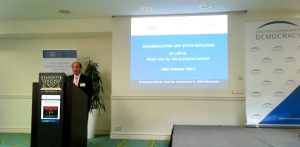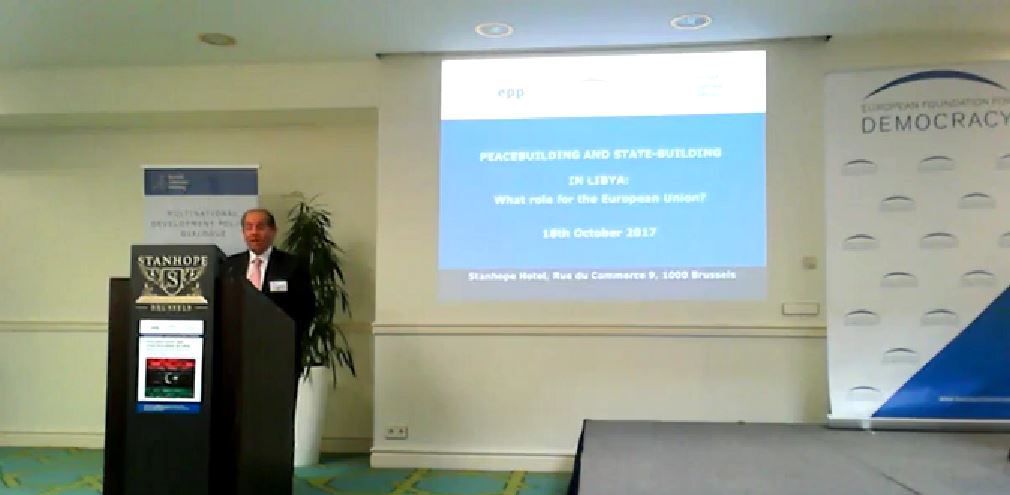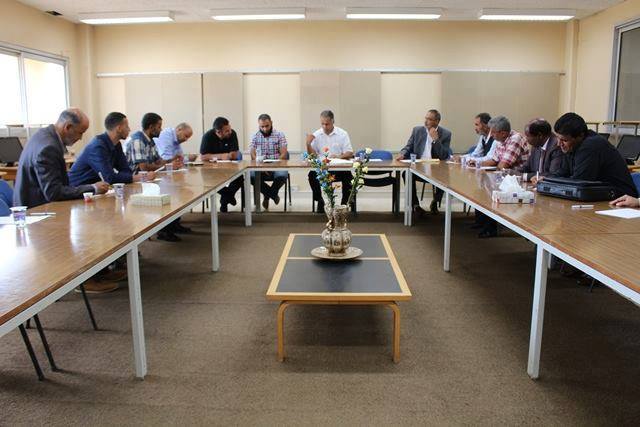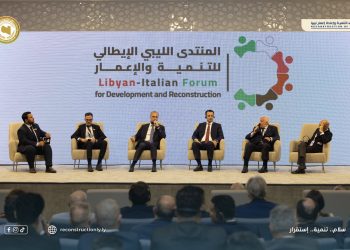By Sami Zaptia.

London, 19 October 2017:
A conference on Libya was held in Brussels yesterday under the banner ‘‘Peacebuilding and State-Building in Libya: What role for the European Union?’’.
The conference was co-organized by Konrad Adenauer Stiftung (KAS), the European Foundation for Democracy (EFD) and the European People’s Party Group (EPP) in the European Parliament. Former Libyan prime Minister and head of the National Forces Alliance party (NFA) Mahmoud Jibril was the keynote speaker.
The conference, hosted by Elmar Brok member of the European Parliament and president of the EPP, discussed the internal and external causes of insecurity and violence in Libya and the role of the European Union in peacebuilding and state-building efforts.
The conference revealed what is at stake if the international stabilization efforts in Libya fail. It was pointed out that although the migration numbers from the shores of Libya to Europe are presently decreasing, this is just a temporary situation given the demographic development and the push factors for migration in Africa. There is the urgent need for a sustainable solution in pacifying and stabilizing the country and in building effective state institutions, the conference was told.
Mahmoud Jibril said that the current EU strategies on Libya, particularly on the migration issue, will only create new problems and further strengthen the militias as the true power holders.
According to him, this is the real catastrophe. He urged that all those who are really interested in upholding human rights, democratic standards and values in dealing with migration, need to develop a sincere solution for this problem.
He underlined that what is called illegal migration in Libya is in reality ‘‘transnational organized crime’’. He said that this was a partnership between the militia leaders in Libya, and their human trafficking partners in Europe in Africa. Europe should do more to combat the European and African parties to this trade to give more credibility to their fight against illegal migration.
He also warned against the idea of creating a new home for all African migrants – of up to 40-50 million people – in Libya which might be appealing for some Europeans. So-called temporary holding or detention camps in Libya for illegal migrants could become permanent settlements like the permanent Palestinian camps, he warned.
Jibril said that if the Europeans were sincere about solving the illegal migration problem they would seek long term win-win solutions. They would invest in win-win development of Africans in their homelands to give them skills to work at home and to prepare them for the European market. Europe’s population was aging and decreasing leaving a deficit of labour for its economic development. Investing by upskilling African workers in their homelandswas a win-win solution.
Jibril said that the recipe for a civil war existed in Libya with no state institutions, a tribal structure, money and weapons and militias. He questioned whether Europe had a sincere desire to rebuild Libya. Europe had lost interest in Libya, and it was only illegal migration and terrorism that has temporarily regained their interest, he explained.
On the current Libya reconciliation initiative proposed by UNSMIL head Ghasan Salame, Jibril was critical of the continued rush for elections. He said he had advised against previous early elections before. Libya, he repeated was a stateless country with no meaningful institutions. The rush to elections had led to Libya becoming the most democratic country in the world he added sarcastically. If you did not like one government or parliament or institution, you could choose another he added. Referring to the split governments and parliaments.
This he said was a joke because the ABC of conflict resolution says that any solution must reflect the reality on the ground – otherwise it’s a joke. It is for this reason that the Libyan Political Agreement signed in Skhirat in December 2015 failed. Meanwhile, Libyan lives continue to be lost and Libya’s money is depleting fast.
Jibril said that Ghassan Salame had got the right diagnosis of the Libyan scenario by bringing the powers on the ground around the table. However, Jibril felt that Salame should have started with his idea of a national reconciliation conference first prior to holding the Tunis LPA amendment talks.
Jibril accused the House of Representatives (HoR) and High State Council (HSC) dialogue committees of being only interested in their own positions. They were more interested in gaining positions in the new bodies and gaining new roles rather than real long-term solutions for Libya.
Sadly, Jibril said that he had been informed that a LD 1 million was being offered already for key positions by the power-brokers – a price which he said would rise as the names of the new positions begin to be discussed.
The amendment of the LPA should have been approved by the proposed national reconciliation conference not the self-interested HoR and HSC dialogue committees. A national conference would have been more representative of the power on the ground, he stressed.
On militias, weapons and militia leaders, Jibril said that they represented the real problems of Libya and their continued existence and increased empowerment is making the problem in Libya worse. He therefore expressed bewilderment at any parties or states that help strengthen Libya’s militias.
The speakers in the following two panels also stressed the security challenges and the need for particularly fixing the economy. Whereas the country is becoming more and more a safe haven for all kinds of terrorists, the economy is developing from a rentier-economy in the Qadhafi-era into a war-profiteering one.
Fighting human trafficking and organized crime will be thus paramount for changing the current development track. However, as long as no functional state institutions exist this is almost a mission impossible. Despite all the difficulties, the EU needs to continue supporting the UN in its efforts to pacify Libya.
Elmar Brok made clear that the EU should fully support the UN Special Envoy for Libya, Ghassan Salamé’s new plan of action in order to build a credible and inclusive framework for further political negotiations. The Europeans have a strong interest in a stable Libya with human rights and rule of law as a value in itself because Libya is our neighbour, he added.
However, he also stressed that irrespective of all the international and European support the country must be always run by Libyans. It is the Libyan people who must have full ownership in determining the future political set-up of their country.







